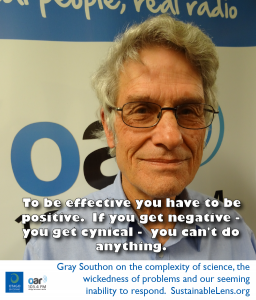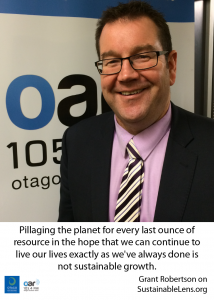(Inability to respond, complexity of science, wickedness of problems yet he seems quite positive) To be effective you have to be positive. If you get negative – you get cynical – you can’t do anything.
Dr Gray Southon first worked in medical physics, eventually becoming a researcher in informatics. Now he is active on the Quaker Futures Committee and in the New Zealand United Nations Association.
Talking points:
The United Nations stopped the third world war – we fully expected it when I was young.
Working through the contrasts of different national interests, of social contrasts, different perspectives, different political interests
We’ve made enormous progress – not enough – but still enormous progress
Climate change is politically difficult. it can’t be too difficult because we can’t pack up and go to another home – we haven’t got another home to go to.
We’ve got to do the best job we can. It won’t be perfect
we have to work to improve understanding, to bring more parties together and to identify and remove blockages.
NZ is one of the slowest movers. The government gives the impression that we are contributing but we shouldn’t be sticking our neck out, but we’re nowhere near sticking our neck out
We’re ruining our reputation by being so slow.
The official policy is that we’re concerned but don’t want to disrupt the economy – they don’t want to sacrifice.
(on critics of UN) To reject a thing is fine is you’ve got a replacement, but there’s no replacement for the UN. We either negotiate or we fight. If you don’t want a world war then you need some way of bringing the nations together. We can work to make it better.
Can there be a just war? No. That level of violence is inherently evil.
The priority has to be to prevent that level of violence. To find ways of resolving conflict in such as way that violence is not required.
We have to learn from our past.
Why has the US got so many military bases around the world? That’s destabilising. Having arms around creates fear. And fear undermines cooperation.
The ‘war on terror’ is horrendous, a quite unnecessary imposition. It has vindicated the terrorists. The United States and its allies have completed the terrorists’ job by imposing terror on the rest of us.
The war on terror has diverted governments’ attention away from development as the main tool for preserving security.
We’ve gotten so tied up with arms as the basis of security, not the first millennium development goal – shared prosperity.
We don’t actually have food scarcity, we waste so much, we distribute it so poorly.
With carbon dioxide we’re polluting our common nest.
There’s no silver bullet, everything is complex, everything has a lot of different angles to it, we need to see it from all those angles and address multiple aspects.
For me at one time sustainability seemed to contradict ideas of progress, that we were putting the breaks on…it took me a while to realise that we’re burning our bridges, we’re destroying the ground under us. We’ve got to find different ways of thinking, different ways of working. People’s understanding of who they are, where they are and what progress is about, their relations to each other and to the world, to the future – these things can be very difficult to understand.
We reject violence in any form, physical including to the environment, emotional violence as well. Interactions need to be based on respect.
(Despite all the effort going into sustainability) we’re still a long way from doing what we need to do. How to people feel about this? How does this inaction affect people?
People have to see the light themselves.
(Inability to respond, complexity of science, wickedness of problems yet he seems quite positive) To be effective you have to be positive. If you get negative – you get cynical – you can’t do anything.
We know what we need to do, I hope we find a way of doing it. But to do that we have to know what the blocks are.
(Miracle question) that the fossil fuel industry has collapsed…investors pull out…we will have to act radically.
(Activist) Yes. Not large scale destruction. There’s an enormous amount that’s valuable, we’ve got to build on it. We’ve got to support the constructive…and try to move the others in that direction.
(Advice) Think carefully about what you do and how you can work together with others to impact policy. Commit to Generation Zero’s Climate Voter.
(What’s driving Generation Zero?) Survival. Our young people, they want to live a life
.
My generation has had the best life of any generation. It’s downhill all the way now.


